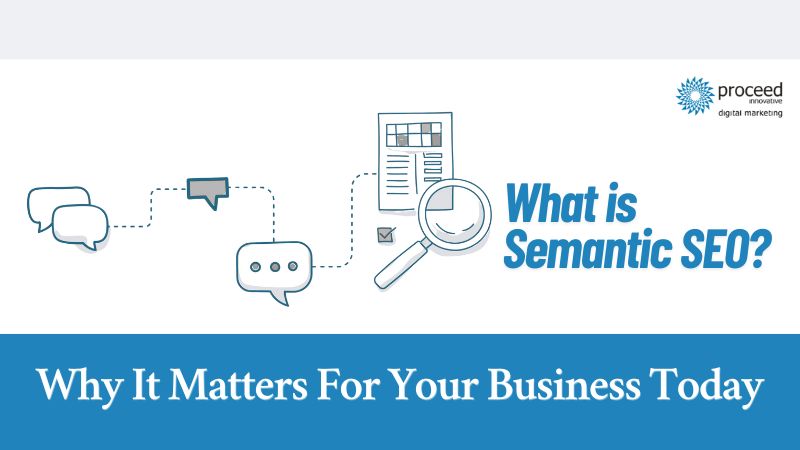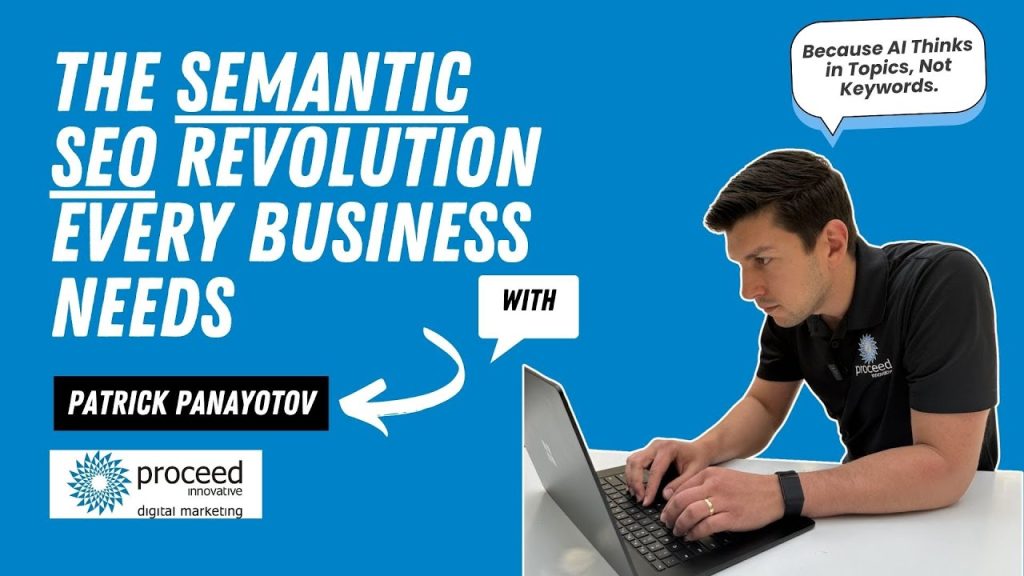In today’s digital landscape, simply stuffing a webpage with keywords isn’t enough to earn a top spot in search engine rankings. Search engines like Google have evolved to understand not just the words on a page, but the meaning behind them. This is why semantic SEO has become so important.
Semantic SEO focuses on creating content that matches the user’s intent and provides deep, meaningful answers to their questions. By optimizing your website for concepts and context, not just isolated keywords, you improve its visibility, relevance, and authority. In this blog, we’ll break down what semantic SEO is, how it works, and why it’s a crucial strategy for anyone looking to succeed in search today. We will also cover some semantic SEO best practices that will help you implement these principles into your digital marketing efforts.
What is Semantic SEO?
Semantic SEO is the practice of optimizing web content so that search engines can understand its meaning, context, and intent, not just individual keywords. Instead of focusing solely on specific search terms, semantic SEO aims to answer the broader questions users are asking and provide comprehensive, relevant content around a topic.
Key Components of Semantic SEO:
- Topical depth: Covering a subject in a thorough, well-organized way rather than creating many pages targeting individual keywords.
- Contextual relevance: Using related terms, synonyms, and entities (like people, places, brands) to help search engines understand the content’s subject.
- User intent: Writing content that addresses what the searcher actually wants to know—informational, navigational, or transactional.
- Structured data (schema markup): Adding metadata to help search engines better interpret the page’s content and show rich results.
- Internal linking: Connecting related content across your site to strengthen topical authority and guide users to more information.
Why Semantic SEO Matters
Semantic SEO is important because it helps your content align with how modern search engines understand and rank information. Instead of matching keywords word-for-word, search engines like Google now prioritize context, meaning, and user intent, and semantic SEO is how you meet those expectations.
The following are the benefits of semantic SEO:
- Improves Search Visibility: By covering topics more comprehensively and using related terms and concepts, your content is more likely to appear for a wider range of relevant search queries, not just one specific keyword. Semantic SEO helps your content align more closely with how search engines like Google interpret queries.
- Matches User Intent: Semantic SEO focuses on answering what users are really looking for. When your content aligns with their needs, it boosts engagement, lowers bounce rates, and increases conversions.
- Broader Keyword Coverage: Instead of ranking for one keyword per page, semantic SEO allows your content to rank for multiple variations, synonyms, and related phrases. This expands your visibility across more searches and boosts organic traffic.
- Reduced Dependence on Exact Match Keywords: As search engines evolve to focus more on meaning and context, you’re less reliant on stuffing exact keywords into your content. This gives you more flexibility to write naturally while still ranking effectively.
- Enhances Topical Authority: When you create content that thoroughly explores a subject, search engines begin to view your site as an authoritative resource, which can improve rankings across your entire domain.
- Supports Voice and Conversational Search: As more people use voice assistants and natural language queries, content that reflects how people actually speak and what they mean is more likely to rank. Optimizing for natural language questions and conversational phrasing improves your chances of being featured in voice assistants like Google Assistant or Siri.
- Works with Evolving Algorithms: Google’s AI-driven updates (like BERT and MUM) are built to understand context and semantics. Optimizing your content semantically makes it future proof against algorithm changes.
- Increases Rich Snippet Eligibility: With the use of structured data, semantic SEO can improve your chances of appearing in featured snippets, knowledge panels, FAQs, and other enhanced search results, making your listings more eye-catching and clickable.
- Future Proofing Your SEO Strategy: Search engines are continuously improving their ability to understand context and user intent. Semantic SEO positions your website for long-term success by aligning with these trends, rather than relying on outdated tactics.
Semantic SEO isn’t just a trend; it’s how modern SEO works. It helps you create content that serves both your audience and the algorithms, giving your website a stronger foundation for sustainable organic growth.
Inspired by pioneers like Koray Tuğberk GÜBÜR, a globally recognized expert in semantic SEO and the founder of Holistic SEO & Digital, our team embraces a data-driven, entity-based SEO approach. We don’t just write content—we engineer it to be deeply relevant, contextually rich, and algorithm-friendly.
“Semantic SEO isn’t just optimization—it’s a way of thinking holistically about how content, user intent, and search engines interact.”
— Koray Tuğberk GÜBÜR
What’s the Difference Between Traditional SEO and Semantic SEO?
While both traditional SEO and semantic SEO aim to improve a website’s visibility in search engines, they take very different approaches. Understanding how they compare will help you recognize why semantic SEO is now the more effective and sustainable strategy.
- Focus on Keywords vs. Focus on Meaning
- Traditional SEO centers around targeting specific keywords and placing them in strategic parts of a page like the title, headings, meta description, and body.
- Semantic SEO goes beyond keywords to understand the intent behind a search using natural language processing (NLP) and artificial intelligence (AI) technology. It incorporates related concepts, synonyms, and natural language to provide more complete, relevant content.
- Isolated Pages vs. Topic Clusters
- Traditional SEO often treats each page as an individual opportunity to rank, sometimes leading to keyword cannibalization (multiple pages competing for the same term).
- Semantic SEO encourages a topic cluster approach, where a central “pillar” page covers a broad topic and links to more detailed, related subpages. This helps establish authority and improves internal linking.
- Optimization for Search Engines vs. Optimization for Users and Search Engines
- Traditional SEO prioritized search engines, sometimes even at the cost of readability, by repeating exact-match keywords to boost rankings.
- Semantic SEO prioritizes user experience, crafting content that answers real questions and reads naturally while still using structured data and relevant terms that search engines can understand.
- Limited Query Coverage vs. Broader Reach
- Traditional SEO might help you rank for one or two specific keywords.
- Semantic SEO allows your content to rank for multiple long-tail queries and related searches, since it’s optimized around ideas, not just terms.
- Minimal Use of Contextual Data vs. Use of Structured Data
- Traditional SEO often ignored markup like schema.org, which helps define the meaning of content.
- Semantic SEO uses structured data and schema markup to give search engines deeper insight into your content, boosting chances of rich results like FAQs, snippets, or product listings.
While traditional SEO laid the foundation for how websites are optimized, semantic SEO reflects how modern search engines actually work today. By focusing on context, intent, and comprehensive coverage, semantic SEO helps you create more valuable content that serves both your audience and the algorithms, leading to better rankings and long-term success.
How to Identify Semantic SEO Keywords
Search engines have evolved to not only understand the meaning of individual keywords and phrases, but also the intent of the user’s search query as well as the relationship between concepts. AI and NLP play a major role in Google’s semantic search algorithm when it comes to analyzing search queries to identify patterns and provide relevant results that best answer a given query.
Traditional SEO strategies often involved creating separate pages for each exact match keyword that were heavily optimized for the targeted keyword. With semantic SEO, you no longer have to create individual pages for each keyword but can instead create content that incorporates a cluster of semantically related keywords that are relevant to the main keyword. Semantic keywords go beyond synonyms of the main keywords and can include keywords and phrases that reflect closely related concepts and ideas.
For example, when optimizing content for the targeted keyword “senior home care,” other primary keywords and synonyms may include “in-home care,” “elderly care at home,” “senior caregiver services,” and “home health care for seniors.” Semantically related keywords for “senior home care” may include the following:
🔹 User Intent-Based Phrases
- how to find senior home care near me
- best home care for aging parents
- when to consider in-home care for elderly
- affordable elder care options
- what does a senior caregiver do?
- signs your loved one needs home care
🔹 Medical and Daily Living Support
- help with bathing and dressing
- medication reminders for seniors
- mobility assistance for elderly
- meal prep for older adults
- light housekeeping for seniors
🔹 Question-Based user search intent
- What’s the difference between home care and home health care?
- How much does senior in-home care cost?
- Is in-home care better than assisted living?
- Can Medicare cover home care for seniors?
These semantic keyword terms consist of related concepts that can add deeper context to your content. This helps Google better understand the topic of your content which makes it more likely to become indexed for improved visibility.
You can find semantically related keywords that are relevant to your main targeted keywords by using the following methods:
- Bold Words in Search Engine Results Pages (SERPS): When searching your main keyword, look for related terms that are bolded in the SERPs.
- Google Autocomplete: Start typing your main keywords into Google and look at the list of related keywords and phrases suggested by Google.
- Topic Modeling: Identify related keywords and phrases and focus content around these keywords to better align with search intent.
- Related Google Searches: When searching your main keyword, scroll down and look at the keywords and phrases in the “People also search for” section.
- People Also Ask: You should also check the People Also Ask section for questions related to your main keyword.
- Google Trends: Keep an eye on related topics for popular searches to find new keyword variations and long-tail keyword phrases.
- Keyword Tools: You can use tools such as Google Keyword Planner and SEMrush to find relevant semantic keywords and phrases. Asking AI tools like ChatGPT for semantic keywords is also effective.
Best Practices for Semantic SEO
Semantic SEO goes beyond targeting individual keywords, it focuses on delivering meaningful, context-rich content that aligns with user intent and helps search engines understand the full scope of your topic. By following semantic SEO best practices, you can improve your site’s visibility, attract more qualified traffic, and enhance the overall user experience. Below are the key strategies to implement for effective semantic SEO.
- Understand User Intent
- Why it matters: Search engines now prioritize intent (informational, navigational, commercial, transactional) over exact keywords.
- Best practice: Tailor your content to what users are actually looking for. Ask: Is the user trying to learn, buy, compare, or find a local service?
- Example: If someone searches “best home care for seniors,” they’re likely comparing options, not just looking for a service list.
- Use Topic Clusters and Internal Linking
- Why it matters: Google wants a well-organized, context-rich site.
- Best practice: Create a pillar page around a broad topic (e.g., “Senior Home Care Services”) and link to detailed cluster pages (e.g., “Dementia Care,” “24-Hour Care”).
- Bonus: Internal linking signals authority and relevance across your content.
- Include Synonyms and Natural Language Variations
- Why it matters: Google’s NLP algorithms (like BERT) understand context, not just exact matches.
- Best practice: Use semantic SEO keywords that include synonyms, related terms, and conversational language to naturally cover more search queries.
- Example: Instead of repeating “home care,” include “senior assistance,” “elder care at home,” or “aging in place support.”
- Optimize for Entities, Not Just Keywords
- Why it matters: Google identifies “entities” (real-world concepts) to connect search relevance.
- Best practice: Make sure your content clearly identifies people, places, organizations, and services.
- Example: Use structured data and include location-specific info like “in-home care in Schaumburg, IL.”
- Use Structured Data (Schema Markup)
- Why it matters: Schema helps search engines better understand your content, boosting rich results.
- Best practice: Implement LocalBusiness, Service, FAQ, and Review schema where applicable.
- Answer Related Questions (FAQs)
- Why it matters: Google uses question-answer format for featured snippets and People Also Ask boxes.
- Best practice: Include a section that answers common user questions using natural phrasing.
- Example: “What services are included in senior home care?” or “Is home care covered by insurance?”
- Optimize for Voice Search
- Why it matters: Semantic SEO supports conversational queries that often come from voice assistants.
- Best practice: Write in a natural, question-answer format and target long-tail, spoken phrases.
- Example: “What’s the best home care service for seniors near me?”
- Use Descriptive, Semantic HTML Tags
- Why it matters: Clean HTML helps search engines parse your content structure accurately.
- Best practice: Use <article>, <section>, <header>, <h2>, <h3>, <p>, <ul>, and <footer> tags properly to signal relevance and relationships. Make sure to write descriptive subheadings to make it easier for search engines to understand your content and for users to find specific information.
- Create Comprehensive, In-Depth Content
- Why it matters: Semantic SEO favors well-rounded, authoritative content that answers multiple user needs in one place.
- Best practice: Cover all relevant subtopics and provide helpful resources, visuals, or videos when possible. Also, be sure to include semantic SEO keywords to cover relevant topics that help match user intent.
- Focus on E-E-A-T (Experience, Expertise, Authoritativeness, Trustworthiness)
- Why it matters: Google assesses the quality of your content and brand credibility.
- Best practice: Showcase real expertise (author bios, client testimonials, credentials), update content regularly, and maintain a secure, accessible website.
- Update Old Content
- Why it matters: Your website may include plenty of pages that were created using traditional SEO methods of targeting main keywords. You can improve the relevance and visibility of existing content by incorporating semantic keywords and related topics that better align with user intent.
Best practice: Identify the best semantic keywords that are relevant to the content and user search intent and naturally integrate these keywords as well as new sections based around semantic keywords into the content.
SEO Marketing Services from Proceed Innovative
Smarter SEO Starts with Semantic Strategy
Search engines are smarter—and so are your customers. That’s why semantic SEO is no longer optional. It goes beyond basic keywords to focus on meaning, context, and user intent, helping your content rank better and truly connect with your audience.
At Proceed Innovative, we specialize in results-driven SEO strategies that align with how search engines—and people—actually search. By using semantic principles, we help you:
Boost organic visibility
Build topical authority
Improve user experience
Future-proof your SEO strategy
Whether you’re enhancing existing pages or starting fresh, we’ll craft a custom plan tailored to your goals and audience.
Ready to level up your SEO?
Contact us today or call (800) 933-2404 to learn how our team can help you grow with smarter, intent-driven search strategies.







